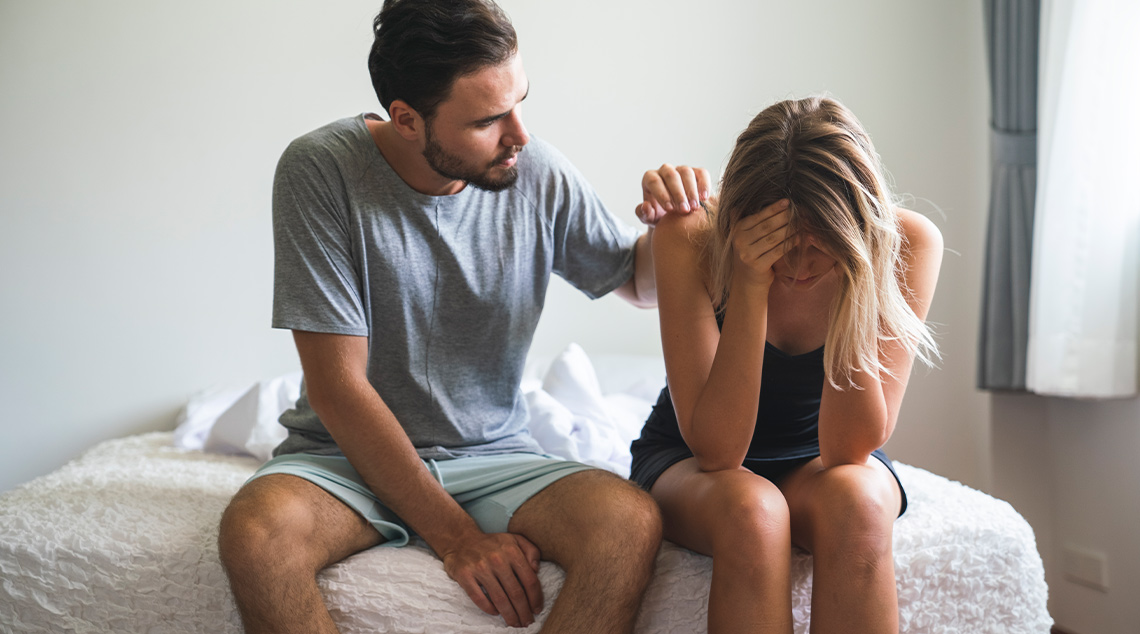Is sex causing pain rather than pleasure? Here’s what to do
For many women, sex causes great physical pain, which can impact self-esteem and relationships. Here’s how to find relief.
Sex is supposed to be fun, right?
But for a surprising number of women, the uncomfortable truth is it really hurts.
“About one in five women find intercourse painful – it’s far more common than you might think,” Women’s Health and Research Institute of Australia gynaecologist Dr Thierry Vancaillie says.
It is known as dyspareunia and Australian Institute of Sexology and Sexual Medicine director Chantelle Otten says it can have a severe impact on self-esteem, emotional wellbeing and relationships.
“It can also cause a sense of isolation as the person may feel embarrassed or ashamed to discuss their condition with others,” the psycho-sexologist says.
Causes of painful sex
Dr Vancaillie says there are many causes of painful sex, from gynaecological issues such as endometriosis and fibroids to menopause and psychological distress.
The good news is most can be treated.
Endometriosis
Dr Vancaillie says endometriosis, or where the uterus lining grows elsewhere in the body such as the vaginal tract, is the most common cause of deep pain during sex.
This is because friction during intercourse can irritate the endometrial growths.
Treatment can be as simple as changing your sex position, but in more complex cases the growths can be removed surgically.
Fibroids
These non-cancerous tumours grow in muscle tissue in and around the uterus, fallopian tubes or cervix.
Up to 80 per cent of women over 50 have fibroids, and most don’t experience any symptoms.
However, some fibroids can cause pain during sex, and these can be treated with hormone medications, high-intensity ultrasound or surgery.
Menopause
Dr Vancaillie says about half of all women in menopause experience painful sex.
“For women in menopause, painful intercourse is linked to the changes in the hormonal environment and a lack of estrogen,” he says.
“That means it’s also relatively easy to treat, and it will usually go away with estrogen supplementation.”
Thrush
Dr Vancaillie says many women have chronic thrush and don’t even know it.
“Quite often thrush is atypical and doesn’t cause itchiness, so a woman wouldn’t necessarily even know she had it,” he says.
“However, the skin is still irritated and this will cause discomfort.”
Dr Vancaillie says while such cases can be difficult to diagnose, they are very straightforward to treat with antifungal medication.
Vaginismus
Vaginismus is a condition where the muscles around the vagina involuntarily tighten making penetration difficult or even impossible.
“It’s often related to psychological factors such as anxiety or trauma,” Chantelle says.
“Treatment may include sex therapy to address underlying psychological issues, physical therapy to improve pelvic muscle function, or the use of vaginal dilators to gradually stretch the muscles and desensitize the area.”
Vulvodynia
Vulvodynia is a chronic, unexplained stinging or burning in the area around the opening of the vagina.
The exact cause is not understood, but Chantelle says it may be related to nerve damage, hormonal changes, or inflammation.
“Treatment options may include medication to manage pain, physical therapy to improve pelvic muscle function, or nerve blocks to reduce pain signals alongside sexology to help make sex pleasurable,” she says.
When to seek help if sex is painful
Dr Vancaillie says research shows women tend to wait at least three months before seeking help.
“This is far too long,” he says.
“Sex should not be painful, and if it is we need to find out why and treat it, so if you have had intercourse that’s painful four or five times in a row, you should see a doctor.”
More sexual health advice:
Written by Dimity Barber.





